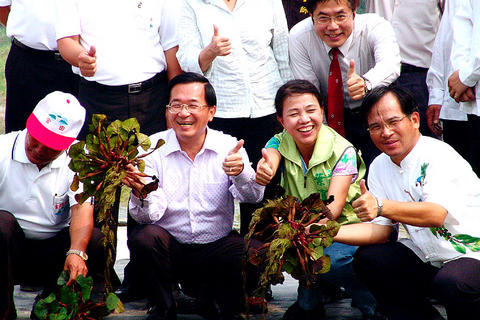Following the premier's dismissal on Friday of a legislator's accusation that the government had launched a nuclear weapons program, President Chen Shui-bian (
Chen said "there is no nuclear missile in Taiwan," adding that the Democratic Progressive Party (DPP) administration "is not going to develop any nuclear missiles."
Chen made the remarks during a trip to Tainan City, in response to Chinese Nationalist Party (KMT) Legislator Su Chi's (蘇起) claims.

PHOTO: CNA
At a question-and-answer session at the legislature on Friday, Su said that the president had recently ordered Chungshan Institute of Science and Technology under the Ministry of National Defense to begin developing nuclear weapons, including nuclear warheads.
Su said he had overheard a heavyweight DPP legislator talking about the nuclear program and saying he was against it.
Premier Chang Chun-hsiung (
Despite the threat posed by hundreds of Chinese missiles aimed at Taiwan, the development of Taiwan's military weapons focuses on war prevention and self-defense, Chang said.
During an interview with the Central News Agency later on Friday evening, Su acknowledged that he had no evidence to back his claims, eventually conceding that he had drawn his conclusions based on "inference."
He said that he had inferred that the government had launched a nuclear weapons program based on information he has "accumulated over the years, as well as on observations and an understanding of the international situation."
Su said that the remarks he claimed to have overheard were "the last straw" and had brought him to a final conclusion.
Su said "the government's intention to develop nuclear weapons" was a "big change," adding that he felt an obligation to "disclose this information."
Chen called Su's claims "a complete lie," adding that making up such a "sensational story" indicated the legislator did not care about national security and interests.
Chen said that the KMT government had considered developing nuclear weapons 20 years ago, adding that it was preposterous to pin such allegations on the DPP.

A preclearance service to facilitate entry for people traveling to select airports in Japan would be available from Thursday next week to Feb. 25 at Taiwan Taoyuan International Airport, Taoyuan International Airport Corp (TIAC) said on Tuesday. The service was first made available to Taiwanese travelers throughout the winter vacation of 2024 and during the Lunar New Year holiday. In addition to flights to the Japanese cities of Hakodate, Asahikawa, Akita, Sendai, Niigata, Okayama, Takamatsu, Kumamoto and Kagoshima, the service would be available to travelers to Kobe and Oita. The service can be accessed by passengers of 15 flight routes operated by

Chinese spouse and influencer Guan Guan’s (關關) residency permit has been revoked for repeatedly posting pro-China videos that threaten national security, the National Immigration Agency confirmed today. Guan Guan has said many controversial statements in her videos posted to Douyin (抖音), including “the red flag will soon be painted all over Taiwan” and “Taiwan is an inseparable part of China,” and expressing hope for expedited reunification. The agency last year received multiple reports alleging that Guan Guan had advocated for armed reunification. After verifying the reports, the agency last month issued a notice requiring her to appear and explain her actions. Guan

GIVE AND TAKE: Blood demand continues to rise each year, while fewer young donors are available due to the nation’s falling birthrate, a doctor said Blood donors can redeem points earned from donations to obtain limited edition Formosan black bear travel mugs, the Kaohsiung Blood Center said yesterday, as it announced a goal of stocking 20,000 units of blood prior to the Lunar New Year. The last month of the lunar year is National Blood Donation Month, when local centers seek to stockpile blood for use during the Lunar New Year holiday. The blood demand in southern Taiwan — including Tainan and Kaohsiung, as well as Chiayi, Pingtung, Penghu and Taitung counties — is about 2,000 units per day, the center said. The donation campaign aims to boost

The Central Weather Administration (CWA) said a magnitude 4.9 earthquake that struck off the coast of eastern Taiwan yesterday was an independent event and part of a stress-adjustment process. The earthquake occurred at 4:47pm, with its epicenter at sea about 45.4km south of Yilan County Hall at a depth of 5.9km, the CWA said. The quake's intensity, which gauges the actual effects of a temblor, was highest in several townships in Yilan and neighboring Hualien County, where it measured 4 on Taiwan's seven-tier intensity scale, the CWA said. Lin Po-yu (林柏佑), a division chief at the CWA's Seismological Center, told a news conference